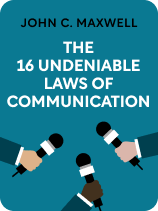

This article is an excerpt from the Shortform book guide to "The 16 Undeniable Laws of Communication" by John C. Maxwell. Shortform has the world's best summaries and analyses of books you should be reading.
Like this article? Sign up for a free trial here.
Have you been asked to give a speech? Are you seeking out opportunities to improve your public speaking skills?
Public speaking expert John C. Maxwell shares advice on how to choose a topic for a speech in his book The 16 Undeniable Laws of Communication. He recommends that you don’t go it alone; rather, you should find a few people who will brainstorm with you.
Read more to learn how to find the right people and, together, come up with winning ideas for your speech.
How to Choose a Topic for a Speech
Maxwell’s advice for how to choose a topic for a speech is to gather a team of people to help you brainstorm ideas. He recommends finding people who are open to new ideas, are flexible when tackling problems, and believe that there are many different ways to solve a problem. Maxwell argues that groups often come up with better ideas than individuals. When you brainstorm by yourself, you can work from only a single perspective. When you collaborate with others, you have access to diverse experiences and insights, which can help you recognize blind spots in your thinking.
(Shortform note: Maxwell seems to imply that any group is composed of people with diverse experiences and insights, but this isn’t always the case. In Rebel Ideas, Matthew Syed writes that some groups are homogenous in that members think similarly and therefore don’t bring fresh perspectives. Not only that, but members of homogenous groups tend to reinforce one another’s viewpoints, which makes them overconfident about flawed ideas. It might therefore be a good idea to ensure your team is cognitively diverse. To assemble a group with cognitive diversity, Syed suggests you find competent people who have many different perspectives and thought processes so you can avoid collective blindspots and generate innovative ideas.)
When brainstorming, encourage people to come up with as many ideas as they can. Maxwell argues that there are no bad ideas—every thought can be a springboard for greater ideas. You can also have your team ask you challenging questions so you can identify and address potential flaws in your arguments from the beginning.
For example, if you want to speak about the value of lifelong reading, gather a team of people to help you brainstorm ideas related to your topic, such as the benefits of lifelong reading that may be relevant to your audience. Team members might have unique perspectives to offer: A person who grew up in a different country might share how their culture approaches and values reading, while someone who has struggled with mental illness might share how reading comforted them during difficult times.
(Shortform note: In Tools of Titans, Tim Ferriss echoes Maxwell’s suggestion to generate a lot of ideas, adding that you can do so by asking basic or “dumb” questions—for example, “Why do kids hate to read?” Although Maxwell argues that there are no bad ideas, you’ll still need to decide which ideas are the best to use for your presentation. To do this, Ferriss suggests you stress-test your ideas. Ask your team to poke holes in each proposed idea. If an idea holds up to the rigorous scrutiny and attack, you can feel confident that it’s one you can use.)

———End of Preview———
Like what you just read? Read the rest of the world's best book summary and analysis of John C. Maxwell's "The 16 Undeniable Laws of Communication" at Shortform.
Here's what you'll find in our full The 16 Undeniable Laws of Communication summary:
- The secrets to becoming a confident and effective communicator
- How anyone can master public speaking, no matter how nervous they get
- How to write a clear and engaging speech






